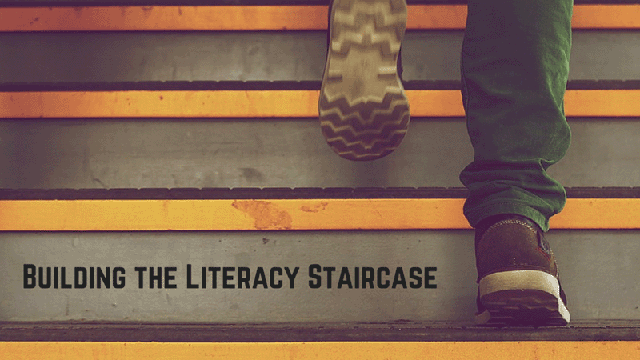Building the Literacy Staircase
Written by Sandie Barrie Blackley, MA/CCC
Published on June 3, 2016
 A pattern of hard work followed by disappointing results and limited progress can naturally lead struggling readers and writers to the conclusion that they “just aren’t smart.” What’s going wrong when bright students work so hard but still can’t seem to develop the type of reading and writing expertise that seems to come naturally to so many of their peers?
A pattern of hard work followed by disappointing results and limited progress can naturally lead struggling readers and writers to the conclusion that they “just aren’t smart.” What’s going wrong when bright students work so hard but still can’t seem to develop the type of reading and writing expertise that seems to come naturally to so many of their peers?
In their new book Peak: Secrets from the New Science of Expertise, Ericsson and Pool explain that, while hard work is important, it is not enough. To overcome their literacy difficulties struggling readers and writers must develop what Ericsson and Pool call rich mental representations or “patterns of information.” To explain, “The relationship between skill and mental representation is a virtuous circle: the more skilled you become, the better your mental representations are, and the better your mental representations are, the more effectively you can practice to hone your skill.” (Peak, p. 70-80)
Children who develop reading and writing skills normally demonstrate their high-quality mental word representations by spelling, generally with unconscious and automatic ease.
 Every skill has its own set of mental representations, patterns that expert users apply automatically and often unconsciously but novices struggle to remember or even notice. The value of practice that focuses on the key mental representations needed for expertise has been demonstrated for various activities, including many sports. For example, research has shown that golfers improve more and faster when they watch videos that spotlight key actions as opposed to videos that show examples of good swings but without highlighting key actions.
Every skill has its own set of mental representations, patterns that expert users apply automatically and often unconsciously but novices struggle to remember or even notice. The value of practice that focuses on the key mental representations needed for expertise has been demonstrated for various activities, including many sports. For example, research has shown that golfers improve more and faster when they watch videos that spotlight key actions as opposed to videos that show examples of good swings but without highlighting key actions.
Ericsson and Pool describe mental representations needed for a skill as “….a staircase that you climb as you build it. Every step of your ascent puts you in a position to build the next step….Your existing mental representations guide your performance and allow you to both monitor and judge that performance.” (Peak, p. 83)
Fortunately for struggling readers and writers, research has identified the mental word representations that are needed for skilled reading and spelling and has described how those mental representations are most efficiently and effectively developed. The term for this method is structured literacy. It begins by identifying the mental representations that the individual student is missing and then provides a “staircase” to expertise.
If you would like to learn more about Lexercise Structured Literacy therapy, you can talk to one of our wonderful, expert therapists here>>>
Improve Your Child’s Reading
Learn more about Lexercise today.
Schedule a FREE
15-minute consultation



Leave a comment